 newsitems
newsitems  OECD Education Head Schleicher to EF: Global Stagnation on Science Students Performance may Hide Gap
OECD Education Head Schleicher to EF: Global Stagnation on Science Students Performance may Hide Gap
OECD Education Head Schleicher to EF: Global Stagnation on Science Students Performance may Hide Gap
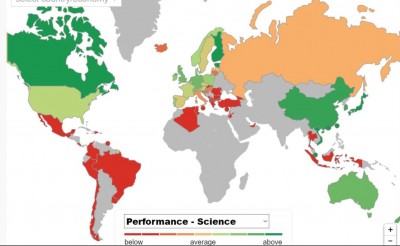
*Strasbourg/OECD Webinar/Angelo Marcopolo/- A Global tendency to augment a Gap in Students' Performance in Science, (from 15 years old), appears during the latest Decade or so, even if it's mainly driven by a Deceleration of former Middle-level areas, as OECD's Directior of Education, Andreas Schleicher acknowleded in fact, in Reply to an "Eurofora" Question, during a special Webinar Q & A Internet Exchange where we had been Invited to actively participate, on this 6 December 2016 Day of Publication of the latest, 2015-made, International Student Assessment Program (known as "PISA") Conclusions for 72 Countries Worldwide.
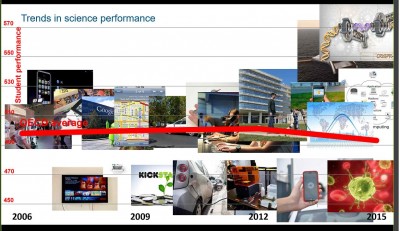
All in all, with Singapoor as First on 2015, China ranks Today always far Above OECD Average, among the Top Countries Worldwide, near Japan, Viet-Nam, Korea and Canada, followed by Australia (at the Pacific Ocean), as well as Finland, Estonia and Slovenia, Before Germany and Switzerland, etc., (i.e. Middle European Countries, between East and West), etc.
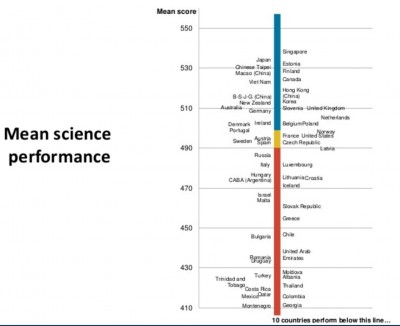
------------------
- "Eurofora"'s asked whether OECD found that "a Lack of Global Progress in PISA (between the Previous Assessment of 2006, and the Latest, New one, of 2015 : i.e. after almost a Decade) might, in fact, Hide a Growing Gap", (among Countries, and/or other Areas, Schools, Students, etc), "or not".
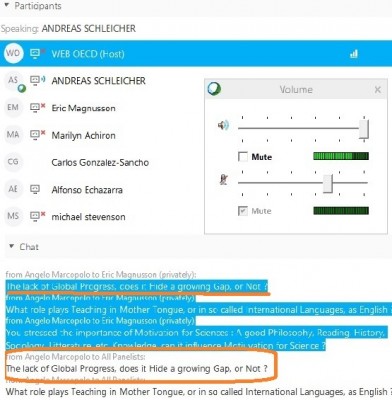
------------
- "Not Necessarily", reacted initialy, but after Careful Thought, OECD's Director of Education, and Special Advisor of OECD's Secretary General, Angel Guria, Andreas Schleicher, However, withOut Excluding that it might be, indeed, the case, in one way or another...
- "I think that What we (OECD) did see, is that there are some Countries, at the very Top", ("Singapoor is the most prominent example", together with Macao, in China, etc), which Keep Rising", he admitted.
- "Meanwhile, there are Countries at the Bottom keep Catching up", Schleicher added.
- "But, there are still Countries in the Middle Group, that have become somewhat Complacent", ("in other words, they are not changing significantly") ,"and there has been a Lack of Progress in sort of Moving Forward", he concluded.
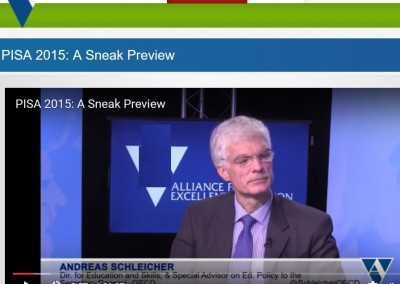
+ In fact, it's no more about a simple Divide between Rich and well Educated Countries, and Poor and Less Educated Countries, since several Middle or Developing Countries are currently Catching up, i.e. by investing comparatively more in Education than elsewhere, (f.ex. Perou, Colombia, etc), Schleicher observed earlier.
+ To this is added, often, also "a Huge Viarability inside Schools, between Classes", etc, OECD's Education Director pointed out.
------------
- As far as the overall, Global situation is concerned, indeed, Worldwide, "Since 2006, Less than 1 Quarter (1/4, 25%) of the Countries are Improving their Performance", denounced previously Today, OECD's Secretary General, Angel Guria, speaking from London, at a Parallel event, for this same purpose.
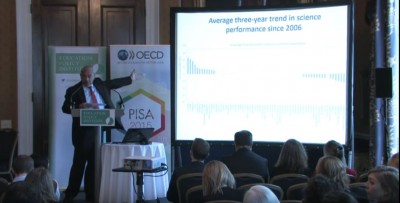
+ This doesn't seem normal, and may provoke concern, also "Because", at the Same Time, "Science itself is Moving at Lighting Speed", (from "Digital", Physics, Biology, to "Medicine", etc), he observed.
"But the Education of Science", at a Global level, has not moved at the Same Speed", i.e. "Science Education isn't Keeping up", (particularly compared to "Science itself"), and, "this Means, that a Cumulative Debt is created, and Every Day adds to it", Guria Warned.
------
In Real Practice, however, Certain Schools might be Performing much Better than Others, in one a same Country, during this period :
- F.ex., France gets an "Average" OECD overall Assessment in PISA, while, in Fact, "a Minority" of French Schools are "performint at very High Levels, compared to the Best Performing Countries", , but "a sizeable Number of Other Schools and Students have a very Low Performance", pointed out in substance PISA-competent OECD Analyst, Carlos González-Sancho, who holds a PhD from Oxford. France is one of the OECD Countries most affected by "Wide Disparities", but "Not Alone", he warned.
Concerning China, another Participant asked whether there was a "Fall in China's results", since, "when Shanghai had participated as a Municipality, in 2012, it was No 1 (of OECD) in all domains", while, "Now", when "3 other Provinces have been added", the "overall Performance (apparently) has Fallen". "Is this a Statisticlly Significant Drop, and What Explains it ?", he queried.
- "In this case, I doN't think that we can speak of a Drop, or Increase", compared to the Past, "Simply, Because it's Not Comparable", denied the PISA-specialist OECD Official.
Indeed, "Shanghai's Performance, as a Single Entity, in the Past, and what we (OECD) have this year, which is the Group of 4 Provinces, we canNot say that it has Droped, or gone Up, ...because they are Not the Same Entities".
=> Only "in the Future, if China chooses to Continue with the Current Format of Participation, we (OECD) could speak of a Trend". But, "for the moment, it's Not yet the case, and we canNot speak of a Trend" currently, he Carefuly pointed out.
*** Last, but not least, OECD's PISA Specialist, significantly Added, at his own Initiative, the Hypothesis for Shanghai, (which notoriously was No 1 in the World on 2012), to have not "droped, as some (surprized of that 2015 Data's Differend Presentation) questioned, but, perhaps, rather, "Gone (Further) Up",... as he Warned, in Conclusion.
I.e., mutatis-mutandis, according to a quite Widespread Trend, nowadays Visible almost entirely, at a Global Level, at least as far as Science Education is concerned, (Comp. also Supra).
>>> In other words, it's Urgent, both for China itself, and for the accuracy of OECD's World-wide Assessment on Student's Performances, to clearly Bring Shanghai back in the Map in a Crystal-clear way, f.ex. by including that City in the Next PISA for the 2016-2019 Period (which is just Starting Nowadays), in a Format Comparable (to the Past and/or to the Present) :
- I.e. if not also as a City, (as in the 2012 Past), at least anew as a Part of a Group of Chinese Regions SImilar to the current 4 (of this 2015 PISA), in order for the Paris-based International Organisation to be Able to Compare in the Future (2012-2018 or 2015-2018 periods), analyse various Possible Causes, and propose Adequate Mesures.
Otherwise, its recent Merger with 3 Other Regions, in the latest such Query made by the International Organisation based in France (Paris), risks to give False Impressions, as far as overall Trends are concerned.
---
Meanwhile, at least one Central Point is for Sure : Main Factors for Science Education Performance amelioration Worldwide are "Students' Motivation", as well as "Quality of Teaching", more Widely speaking, as OECD's Education Director, Andreas Schleicher, highlighted, in conclusion of this almost 10 Years-long OECD Comparison in that field (2006-2015) Today.
-------------
Strasbourg hosts OECD's main Annual PanEUropean Parliamentarian Public Debates Forum, thanks to CoE's Assembly, which has 47 Member Countries (including Russia), and several More Observers or other Special status participants accross the World, (as, f.ex. USA, Canada, Japan, Mexico, Morocco, Tunisia, even Australia, etc, recently approached also by China, which has already got such a Status in CoE's body for Cities + Regions : CLRAE, etc), Regularly visited, very actively, by OECD's Secretary General Angel Gurria himself, during Many Years, (Comp., f.ex., several Angel Gurria statements to "Eurofora"+, both in Paris' OECD Headquarters and elsewhere, but more often in Strasbourg's COE HQ).
***
Main Menu
Home Press Deontology/Ethics 2009 Innovation Year EU endorses EuroFora's idea Multi-Lingual FORUM Subscribers/Donors FAQs Advanced search EuroFora supports Seabird newsitems In Brief European Headquarters' MAPs CoE Journalists Protection PlatformBRIEF NEWS
- 00:00 - 02.06.2021
- 00:00 - 18.10.2020
- 00:00 - 19.06.2020
- 00:00 - 18.05.2020
- 00:00 - 20.04.2020
- 00:00 - 02.02.2020
- 00:00 - 09.12.2019
- 00:00 - 27.11.2019
- 00:00 - 16.11.2019
Popular
- Yes, we could have prevented Ferguson riots says World Democracy Forum's Young American NGO to ERFRA
- Spanish People Elect CenterRIGHT Majority with 1st Party and Total of 178 MPs (6 More than the Left)
- Pflimlin's vision
- The European Athletic "Dream Team", after Barcelona 2010 Sport Championship Results
- Source Conseil d'Europe à ERFRA: Debatre Liberté d'Opposants à Loi livrant Mariage+Enfants à Homos ?
- Head of BioEthics InterGroup, MEP Peter Liese : "Embryonic stem cell research reaching its END" !?
- Spain: Jailed Turkish Terror suspect with Explosive,Drones,Chechen accomplices stirs Merah+ Burgas ?
- UN Head Ban Ki Moon at CoE World Democracy Forum : - "Listen to the People !"
Latest News
- Test Photos (f.ex.+ Invit to EU + Korea Peace meeting)
- EUOmbudsmen Conference 2022: Digital Gaps affect People's Trust threaten EF Project on EU Future ?
- French Election : Black Out on Virus, but Obligation for Fake 'Vaccines" Challenged
- Both French Presidential Candidates point at "Humanism" in crucial times...
- France : Zemmour = Outsider may become Game Changer in Presidential + Parliamentary Elections 2022
Statistics
Visitors: 59826681Archive
Login Form
Other Menu
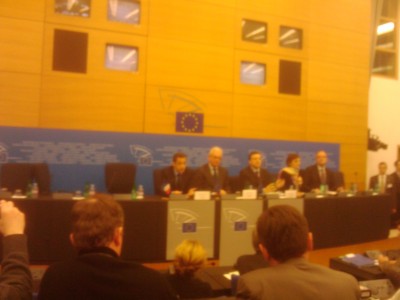
Recent developments proved that Europe can suceed to overcome challenges by aiming at great objectives, and this is needed also in 2009, said EU chairman, French President Nicolas Sarkozy.
- "It's in the name of Great Ideas, Projects, Ambition and Ideals, that EU can overcome" challenges, stressed Sarkozy at EU Parliament in Strasbourg, in conclusion of a dense 7 months EU Chairmanship. "It's even easier for Europe to have Great projects, able to overcome national egoism, instead of limiting itself only to small projects" (unable to do alike), he observed.
- "Europe must remain Ambitious and understand that the World needs her to take Decisions". "The World needs a Strong Europe", which "thinks on its own, has convictions, its own responses, its imagination" : "A Europe which does not limit itself into following" others, (as it did in the Past, when it followed USA, f.ex. on Bosnia). On the contrary, "Europe should undertake its own responsibilities", he said, after a series of succes in stopping the War between Russia and Georgia, and organizing the 1st EuroZone's Summit in Paris, which incited the Washington DC G-20 Summit to extend similar decisions World-wide.
- "When you sweep it all under the carpet, prepare yourself for hard tomorrows", he warned. "What hinders decisions is the lack of Courage and Will, the fading away of Ideals", he stressed before EU Parliament's 2008 debate on Human Rights and Sakharov prize on Freedom of thought attributed by MEPs to Chinese cyber-dissident Hu Jia, followed by an EU - Turkey meeting on Friday.
- "I don't abandon my convictions" and "I will take initiatives" on EU level also in 2009, Sarkozy announced later. "France will not stop having convictions and taking initiatives" on Europe. + "It's an Error to wish to pass over the Heads of those who are elected in their Countries" : "It's an integrism I always fought against"', he warned.
---------------------
French EU Presidency faced 4 unexpected Crisis :
- An institutional crisis, with the Irish "No" to EU Lisbon Treaty, just before it started. A geopolitical crisis, wth the threat of War between Russia and Georgia risking to throw Europe back to Cold-war divisions, on August. A World-wide Financial and Economic crisis, arriving at a bad moment before crucial 2009 EU elections. And even a Strasbourg's mini-crisis, with EU Parliament's roof curiously falling down, from unknown reasons, in a brand new building on August, provoking an unprecedented transfert of the 2 September Plenary Sessions...
But it wasn't enough to stop Sarkozy ! On the contrary, it stimulated him...
---------------------------------------
- "The better way to deal with the recent problems of EU institutions (as the "3 NO" by France, the Netherlands and Ireland) is to take them as a "Test" in order to find solutions closer to Citizens' concerns", said later in Strasbourg Sarkozy's new choice as Ministe for EU affairs, Bruno Le Maire.
- On the Institutional front, Sarkozy gave Time to the Irish to think about it, and stroke on December a deal including a New Referendum after the June 2009 EU Elections, in exchange of a promise to keep the rule of "one EU Commissioner for each EU Member Country", and some opt-outs on Defence and Fiscal EU policies, Abortion, etc. If the Irish get a "Yes" Majority, then the institutional package could be completed in 2010 or 2011 on the occasion of Croatia's probable EU accession.
He was accused in Strasbourg to upgrade EU Council and downgrade EU Commision, but he replied that "strong Political initiatives by EU Council reinforce also the more technical role of EU Commission, under the political-technical leadership of its President", all 3 "working together with EU Parliament".
- But, meanwhile, Sarkozy energetically spearheaded an Historic 1st Summit of EuroZone's 15 Heads of State and Government at EU's core, exceptionally enlarged to a partial participation of British Prime Minister Gordon Brown, on October 12 in Paris' Elysee palace, which started to tackle succesfully the growing world Financial crisis.
It also paved the way for its endorsement by a subsequent Brussels' 27 EU Member States' gathering, before it all come to Washington's G-20 Summit. And "Europe was united, it asked for the 1st G-20 Summit, and it will also organise the next G-20 Summit on April in London", he observed.
But a Conference with EU, Russia, African and other Developing Countries, hosted in Strasbourg shortly after Washington G-20 Summit by the French EU Presidency, took a Resolution asking to enlarge participation to Global Economic Governance. Many found, indeed, illogic and unacceptable that f.ex. states as Turkey were given a seat at G-20 level, while all African Countries, and even the African Union itself, representing the greatest Continent on Earth, were excluded...
Meanwhile, even USA''s "Paulson No 3" Plan, was, in fact, inspired by Europe's No 1 Plan", Sarkozy observed, largelly applauded by MEPs.
And "Europe showed Solidarity" by mobilizing some 22 Billion credit for Hungary, 1,7 billion for Ukraine, as we do nowadays for Baltic States, etc., he added.
The move on Economy was extended on December by an EU stimulus' plan totalling some 200 billion Euros, including 5 Billions released by EU Commission for big Projects, as well as various parallel National plans for Economic revival, (fex. 26 billions in France alone). They might appear limited, compared to USA President-elect Obama's reported plan to boost the American economy with 800 billion $, but at least succeded to overcome Europe's divisions for the first time on Economic governance, opening new horizons.
- The French President stressed even harder the unique role of an active EU Council's chairmanship, when he moved swiftly and efficiently, at the beginning of August, to succesfully stop War between Russia and Georgia, at the last minute, which threatened to bring Europe back to Cold War division.
"We (EU) also wanted to avoid a situation like in Bosnia, in the Past, when EU was absent, so that our American friends took their responsibilitues, and EU only followed", despite the fact that the conflict took place in Europe. Now, it was the EU who took its responsibilities".
A roadmap towards a new PanEuropean Security policy, before which all unilateral moves to place new Missiles (from USA or Russia) would be freezed, was proposed by Sarkozy after a meeting with Russian president Medvedev, at the eve of Washington DC's G-20 Summit.
Ukraine's "European" character was stressed at a Sarkozy - Jushenko Summit, September in Paris, while EU adopted on December an "Eastern policy", in which, "I'm convinced that our (EU's) future is to find with our Neighbours the conditions for Economic Development. Peace and Security, by explaining them that.. they must respect (Human Rights') Values, and adopt behaviors different from the Past", explained Sarkozy in Strasbourg.
Meanwhile, the "Union for the Mediterranean" was created, since July's Summit if 45 Heads of State and Government in Paris, as "an organisation for a permanent Dialogue, that we need", mainly in order to tackle the Israeli-Palestinian conflict, by bringing together, for the 1st time, Israelis and Arabs, where "Europe must be present, in order to avoid a frontal clash".
- "If Europe doesn't take its part for Peace in the Middle-East, nobody else will do that in our place", Sarkozy stressed.
-----------------------
Meanwhile, other EU Agreements were brokered during the French EU Presidency on Immigration, (fex. common Asylum rules, etc), and Climat- Energy :
- On Climat-Energy, the 2007 German EU Presidency had fixed a triple 20% aim for 2020 (20% renewable Energies, 20% reduction of CO2 emmission, 20% energy efficience/economies), and the 2008 French EU Presidecny realized that, making the necessary compromises in order to modernize EU's industry, but without throwing some former Central-Eastern European Countries into abrupt Economic break down risking "social explosion".
- Defence-Security EU policy was mainly postponed for April 2009, since both German chancellor Merkel and French president Sarkozy want to strike a deal with the new American president Obama in Strasbourg's NATO Summit.
However, with all these 4 unexpected Crisis diverting attention to other urgencies, People wil wonder now, what happened to the famous deal proposed by freshly-elected French President Sarkozy on Turkey's controversial EU bid, back on August 2007, to continue EU - Turkey negotiations, but on the double condition that core chapters, intrinsequally linked with EU Membership, will be excluded, and that a collective Reflexion and Debate on Europe's future would start before the end of 2008.
It was meant to reply to the crucial question : What kind of Europe do we want in 10 or 20 Years from now : A large Market, or a Political Europe, with a popular identity ? In Sarkozy's thinking, presented in his 2 landmark speeches on Europe in Strasbourg, shortly before and after the 2007 Elections, (on February and July 2007), Turkey's controversial EU bid would be incompatible with the second choice.
It's true that EU Commision's Chairman, Jose Barroso, (who had notoriously declared, as former Portuguese Prime Minister, that he found "nonsense" the idea that Europe might become equal to the US), had repeatedly tried to avoid that Sarkozy's criticism on Turkey might start winning a larger audience in Europe, preferring a discrete "wismens' committee" work. And that most of the personalities later chosen in order to participate in a Committee on Europe's Future, are too much linked with Socialist parties and/or American policies, to be really critical of USA's notorious wish to impose Turkey to the EU, as Sarkozy had noted himself since March 2007..
- "It's on EU Council's presidency to take political initiatives. EU Commission has other competences", stressed Sarkozy. The "European Ideal" is to "build Europe with the States, not against them". "Ask Europeans to chose between their countries and Europe won't work. You don't choose between your two parents : We must add them together".
"France and Germany have an Historic Duty to work together, precisely because of what happened to the Past. We have to work hand by hand. We cannot be separated.It goes beyond me and Mrs Merkel today, Mr Schroeder and Mr. Chirac yesterday. It's not a choice, it's a duty to Europe and to the World". "We need Germany, as Germany needs Europe". Compromise is inevitable, here as everywhere, and each one made some steps towards eachother's positions.
But "it's true that Mrs Merkel didn't chose her Socialist partners, while I chose mine", Sarkozy said, in an indirect hint that the Socialist Minister of Finance in Germany might be a cause of minor past disagreements in Economy, which were overcome in recent negotiations.
"We (France and Germany) have particular duties in Europe", but "in a Europe of 27 Member States, it's not enough for France and Germany to agree between them.
"I always thought that Great Britain has a special role to play in Europe. ... Now, everybody "saw what it cost payed the UK for having been too exclusively open towards the US (and) Financial services. Europe needs the UK, but also the UK needs Europe" :- "We were able to face the hardest moment of the Financial crisis because the UK clearly chose Europe", stressed Sarkozy, reminding Gordon Brown's exceptional participation to the Historic 1st Heads of State/Government Summit of EuroZone, October 12 in Paris (See EuroFora's Reportage from Elysee Palace then).
- "Some look at Europe with old glasses aged 30 years ago. While we must look at her in relation to what it will be in 30 years" in the Future, Sarkozy concluded.


















